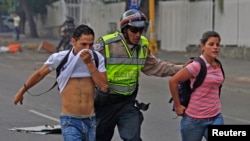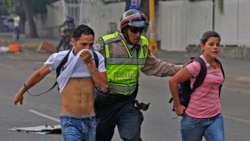U.S. leadership at the 25th United Nations Human Rights Council, or HRC, helped to keep the Council at the forefront of efforts to promote and protect human rights.
The United States successfully led two resolutions at the recently completed session: one that renewed the mandate of the Special Rapporteur on freedom of opinion and expression and another focusing on accountability for human rights abuses and violations in Sri Lanka.
For the first time, the Sri Lanka resolution called for a comprehensive investigation, to be led by the Office of the High Commissioner for Human Rights into alleged violations and abuses of human rights and related crimes committed in Sri Lanka by both sides during the civil war from 2002-2009.
With regard to Iran, for the fourth year in a row, the HRC passed a resolution condemning the deplorable human rights situation in Iran.
The HRC passed a resolution on Syria, which extends the mandate of the Syria Commission of Inquiry for another year. In addition, the resolution condemns in the strongest terms the widespread and systematic violence by Syrian authorities and government–affiliated militias as well as human rights abuses by anti-government armed groups. It also calls for the immediate release of all arbitrarily detained persons, improvement in prison conditions, and access for independent monitors.
With regard to North Korea, the HRC voted to condemn the country for its ongoing human rights violations and to continue to collect information on abuses. On Burma, a resolution was adopted calling for the renewal of the Special Rapporteur's mandate in order to maintain a mechanism for international human rights monitoring in Burma. Particular concerns remains regarding the treatment of Muslim minorities.
The U.S. and 41 other countries joined together in support of the Ukrainian government and called on Russia to ensure access and protection for UN and Organization for Security and Cooperation in Europe human rights monitors in Ukraine.
And finally, with regard to Venezuela, the U.S. called on the government there to end violence against protestors and release those detained for exercising their right to peaceful protest and free expression.
The United States, said U.S. Secretary of State John Kerry, "will continue to speak out. . .on behalf of people who stand up for their universal rights. And we will stand up. . .for those who are deprived of the opportunity to be able to stand up for themselves."
The United States successfully led two resolutions at the recently completed session: one that renewed the mandate of the Special Rapporteur on freedom of opinion and expression and another focusing on accountability for human rights abuses and violations in Sri Lanka.
For the first time, the Sri Lanka resolution called for a comprehensive investigation, to be led by the Office of the High Commissioner for Human Rights into alleged violations and abuses of human rights and related crimes committed in Sri Lanka by both sides during the civil war from 2002-2009.
With regard to Iran, for the fourth year in a row, the HRC passed a resolution condemning the deplorable human rights situation in Iran.
The HRC passed a resolution on Syria, which extends the mandate of the Syria Commission of Inquiry for another year. In addition, the resolution condemns in the strongest terms the widespread and systematic violence by Syrian authorities and government–affiliated militias as well as human rights abuses by anti-government armed groups. It also calls for the immediate release of all arbitrarily detained persons, improvement in prison conditions, and access for independent monitors.
With regard to North Korea, the HRC voted to condemn the country for its ongoing human rights violations and to continue to collect information on abuses. On Burma, a resolution was adopted calling for the renewal of the Special Rapporteur's mandate in order to maintain a mechanism for international human rights monitoring in Burma. Particular concerns remains regarding the treatment of Muslim minorities.
The U.S. and 41 other countries joined together in support of the Ukrainian government and called on Russia to ensure access and protection for UN and Organization for Security and Cooperation in Europe human rights monitors in Ukraine.
And finally, with regard to Venezuela, the U.S. called on the government there to end violence against protestors and release those detained for exercising their right to peaceful protest and free expression.
The United States, said U.S. Secretary of State John Kerry, "will continue to speak out. . .on behalf of people who stand up for their universal rights. And we will stand up. . .for those who are deprived of the opportunity to be able to stand up for themselves."






